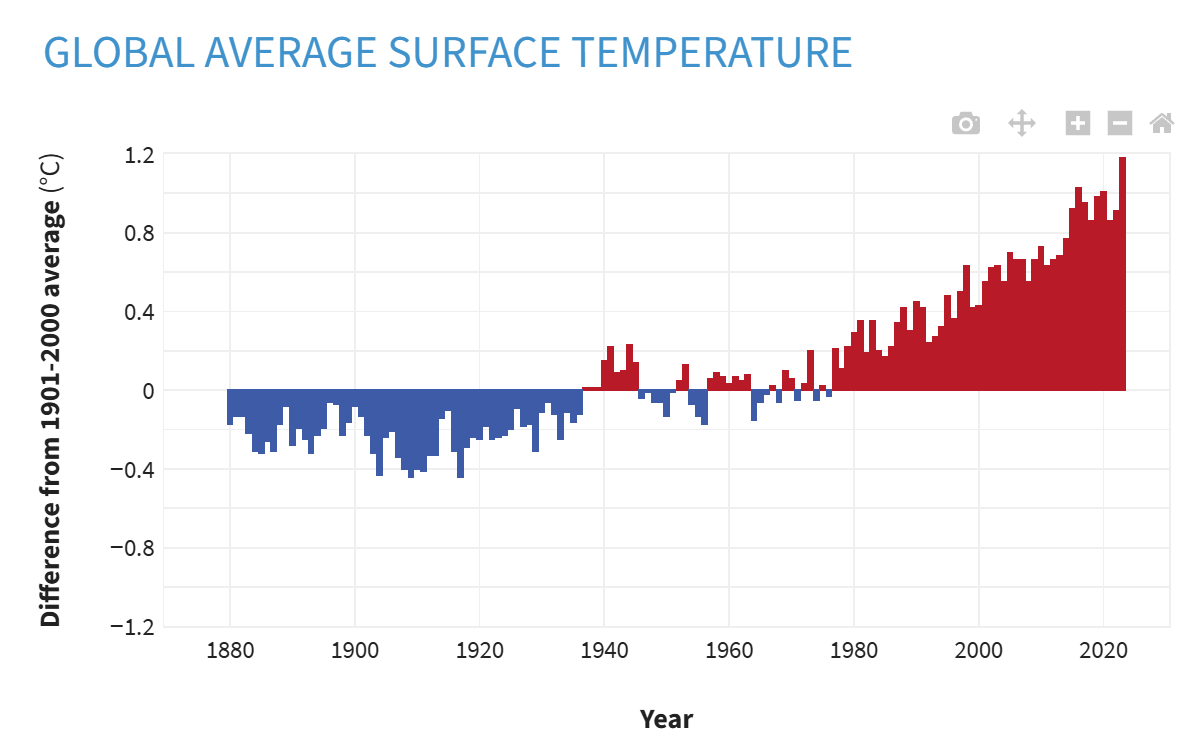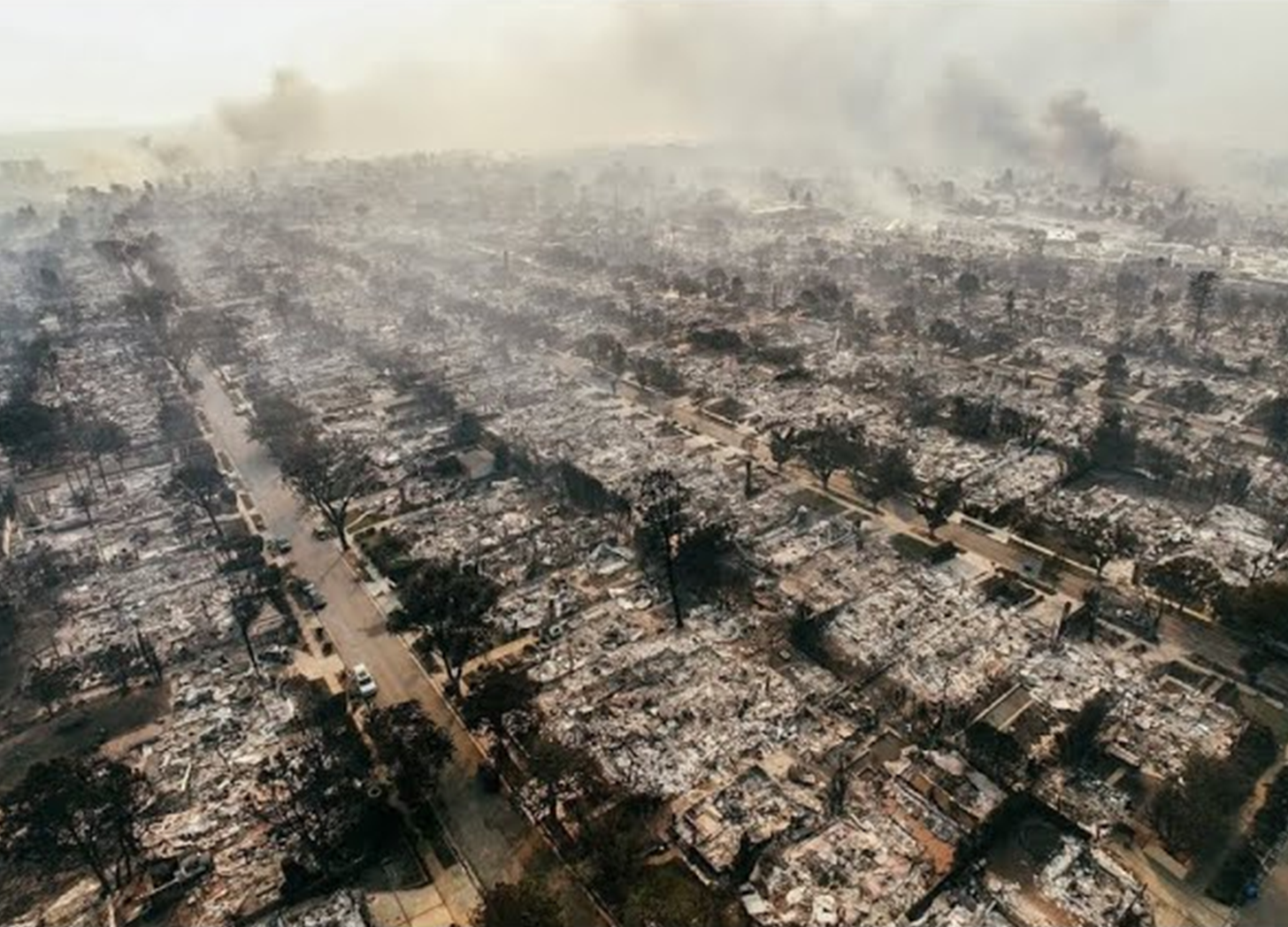Los Angeles Wildfires: The Flames Are Here, But So Are the Lies
How Misinformation, Greed, and Political Inaction Are Fueling the Flames of Climate Catastrophe
Facts: The Firestorm in Los Angeles
Los Angeles County is in the grip of one of the most devastating wildfire crises in recent history. Four active wildfires have already consumed nearly 40,000 acres, leaving at least 16 people dead and destroying or damaging over 12,000 structures. Thousands of families have been displaced, their lives upended as the fires rage on, fueled by unusually powerful January winds and the arid conditions of a region battered by drought.
These rare, deadly winds, at times, grounded critical aerial firefighting operations, a key tool in containing fires of this scale. Without helicopters and planes, firefighters were left battling the flames with limited resources as the winds, combined with tinder-dry landscapes, allowed the fires to spread with terrifying speed.
The financial toll of the disaster is projected to be unprecedented. According to AccuWeather, early estimates place the damage and economic losses between $135 billion and $150 billion, potentially making this the costliest wildfire in U.S. history. The fires have ravaged densely populated and high-value areas, including Pacific Palisades and Malibu, known for their multimillion-dollar properties. Aon's preliminary analysis supports these projections, noting that the scale and destruction per acre far exceed those of previous wildfires.
To put the numbers in perspective, this disaster could amount to nearly 4% of California’s annual GDP. While the final tally of losses will take months to determine, the staggering human and economic costs are already clear.
This disaster highlights the limits of emergency preparedness. Despite Los Angeles’ extensive firefighting resources, the unusual weather conditions overwhelmed efforts to contain the crisis. These fires are not random acts of nature; they are direct consequences of a worsening climate crisis that is making extreme weather events more frequent and severe.
Misinformation Adding to the Chaos
As if the disaster itself weren’t enough, misinformation is exacerbating the chaos. Social media posts falsely claiming volunteers could assist with cleanup forced officials to spend valuable time debunking these rumors. Cal Fire emphasized that only trained personnel could safely work in such dangerous conditions.
Adding to the misinformation is Donald Trump, who falsely blamed California’s water management policies for the fires. In baseless social media posts, Trump accused Governor Gavin Newsom of refusing to sign a “water restoration declaration” that would supposedly have mitigated the crisis. He even linked the fires to protecting the delta smelt, a fish often used as a scapegoat in anti-environmental rhetoric. These claims, dismissed by experts as irrelevant and scientifically inaccurate, detract from addressing the real issue: climate change.
Trump also falsely claimed that FEMA funds were depleted due to mismanagement under President Joe Biden, and that fire hydrants lacked water. These assertions have been debunked, but the damage of such misinformation—especially from prominent figures—cannot be overstated. It distracts from meaningful discourse, hinders disaster response, and divides the public at a time when unity is most needed.
The Role of Climate Change
The true driver of these fires is climate change. Decades of rising global temperatures, fueled by human activity and the unchecked burning of fossil fuels, have left California more vulnerable than ever. Drought conditions have worsened, vegetation has dried out, and heatwaves have intensified. These are not natural cycles; they are the direct result of human actions.

Experts warn that the Los Angeles fires are a preview of what’s to come. The Fifth National Climate Assessment, authored by 14 federal agencies, confirms that every region in the U.S. is experiencing worsening effects from climate change. California, with its long history of wildfires, is especially at risk, but no area is immune.
As denying climate change becomes increasingly untenable, some Republican leaders have pivoted to attacking renewable energy solutions instead. Trump and others have spread bizarre falsehoods about wind turbines, undermining trust in solutions critical to addressing climate change.
The Cost of Inaction
While politicians deny and deflect, ordinary people are paying the price. Families have lost their homes, firefighters are risking their lives, and communities are facing years of recovery. Each disaster serves as a brutal reminder that the longer we delay action on climate change, the greater the cost in life, livelihoods, and property.
USOS Analysis: Uniting to Confront an Existential Crisis
The devastation in Los Angeles is more than a localized tragedy—it’s a glaring indictment of systemic failures. Through the Unified Social Operating System (USOS) framework, we see the interconnected issues driving these crises and identify solutions rooted in principles of Truth, Responsibility, and Sustainability.
· Truth - A Crisis of Misinformation: The wildfire crisis underscores the catastrophic impact of misinformation. Figures like Trump who dismiss science and spread falsehoods about environmental issues contribute to division, confusion, and paralysis when urgent action is needed. A commitment to evidence-based decision-making and combating disinformation is essential.
Responsibility - Failing Those on the Frontlines: First responders and displaced families are bearing the immediate costs of these fires, while the real culprits—fossil fuel executives, complicit politicians, and disinformation spreaders—face no meaningful accountability. Responsibility must be enforced at every level, from holding industries accountable for emissions to demanding that public officials act in the public interest.
Sustainability - The Cost of Ignoring Climate Change: The Los Angeles wildfire reveals the unsustainable nature of our current trajectory. Climate change is pushing disaster response systems to their limits. Without urgent action to transition to renewable energy and build climate-resilient infrastructure, the scale of destruction will continue to outpace our capacity to respond.
This wildfire also highlights a broader failure: our inability to unite as a society. Divisive rhetoric and deliberate misdirection from leaders undermine collective efforts to address existential threats. The USOS framework calls for systemic reforms that align governance, media integrity, and public accountability with the principles of truth and sustainability.
Conclusion: A Moment of Reckoning
The Los Angeles wildfires are a brutal reminder that the cost of inaction on climate change is measured in lives lost, homes destroyed, and communities devastated. Sixteen people are dead, tens of thousands of acres are scorched, and thousands of families are left with nothing but ashes and heartbreak.
This is not just a natural disaster—it is a man-made crisis fueled by decades of corporate greed, political inaction, and deliberate misinformation. Leaders like Donald Trump, who dismiss climate science as a hoax and mislead the public about solutions, have blood on their hands. Their refusal to confront the climate crisis, coupled with the fossil fuel industry’s stranglehold on policy, ensures that disasters like these will only grow more frequent and more devastating.
But here’s the truth: you can be part of the solution. By holding leaders accountable for their lies—with your votes, your voices, and your actions—you can demand the truth, the accountability, and the bold action this crisis demands. Misinformation thrives in silence, so share articles like this one with others. Help spread awareness of the real causes and the real culprits behind these disasters. Together, we can break the cycle of denial, deflection, and inaction.
We also invite you to join us in our mission at The American Manifesto. By sharing our stories, subscribing, or becoming a paid supporter, you enable us to continue working on exposing the truth and fighting for a better future. Your support empowers us to tackle the root causes of disasters like these and advocate for systemic change.
The path forward is clear. We must rebuild our public discourse on a foundation of truth, demand accountability from our leaders, and prioritize sustainability through investment in renewable energy and climate-resilient infrastructure. The Unified Social Operating System framework offers a guide for systemic change, but principles mean nothing without action.
If we fail to act, the future will be defined by more fires, floods, and suffering. But if we rise to meet this challenge—if we work together as an informed and united community—we can build a future where disasters like these no longer devastate our lives, our homes, and our planet.
This moment is a test of our values and our resolve. Let’s meet it head-on, not just for ourselves but for the generations that follow. Together, we can demand the truth, build a better system, and create a world where the next fire doesn’t have to burn everything to the ground.
The time for debate is over. The time for action is now. Join us. Share this. And let’s rise together to meet the challenge ahead.
Sources
Julia Jacobo, "The GOP has transitioned from climate denial to climate misrepresentation, experts say", ABC News, August 27, 2024.
Jeff Cercone and Caleb McCullough, "Fact-check: Los Angeles fires fuel falsehoods, including by Trump about water management", PolitiFact, January 10, 2025.
Kwasi Gyamfi Asiedu, "FEMA didn’t spend all its money on immigrants. It has billions to respond to California fires", PolitiFact, January 10, 2025.
Julia Gomez, "California wildfires: Officials debunk online posts calling for cleanup crews, volunteers", USA Today, January 12, 2025.
Alexandra Marquez, "Gov. Gavin Newsom slams Trump's disinformation about California wildfires", NBC News, January 12, 2025.
Mark Joyella, "On Fox, Donald Trump Calls Climate Change A ‘Hoax’: ‘In The 1920’s They Were Talking About Global Freezing’", Forbes, March 21, 2022.
Jessie Yeung, Rebekah Riess, Adrienne Vogt, Amanda Musa, Christina Zdanowicz, Zoe Sottile, Emma Tucker, and Nouran Salahieh, "Los Angeles wildfires live updates", CNN, January 12, 2025.
Alex Veiga, "The LA county wildfires could be the costliest in US history, early estimates say", ABC 6, January 11, 2025.





